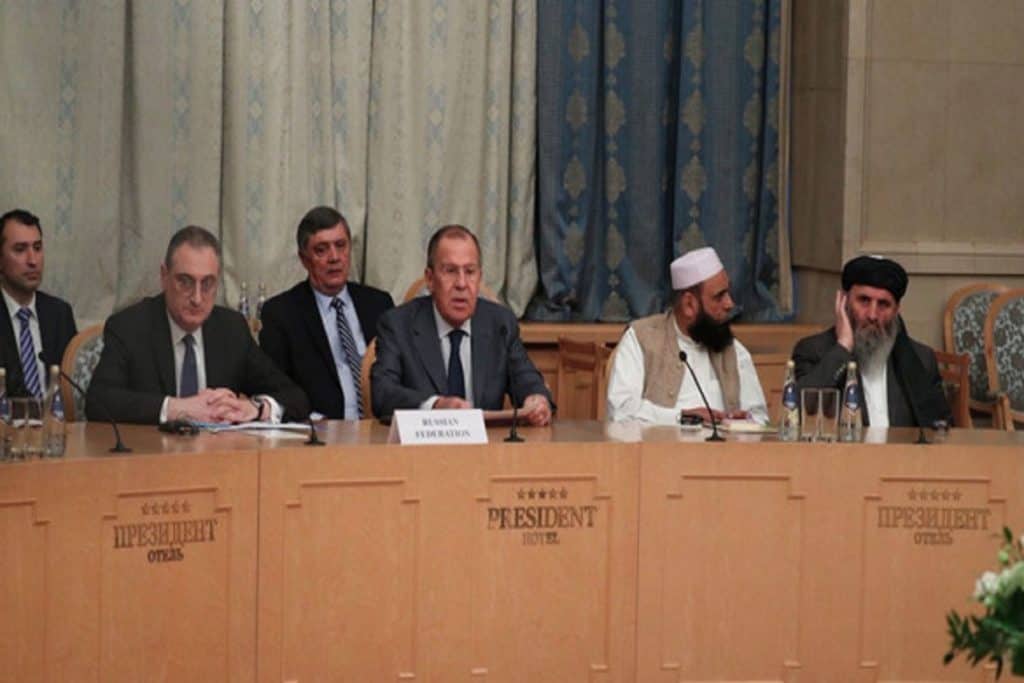By Denis Korkodinov
Russia called on the international community to quickly withdraw foreign troops from Afghanistan and intensify the intra-Afghan negotiation process in order to find a compromise. These statements were made almost immediately after the visit to Moscow of ex-President of Afghanistan Hamid Karzai and representatives of the Qatari branch of the Taliban movement on May 27, 2019.
However, the Kremlin’s mediation has disturbed the current leadership of Kabul, which has been excluded from the Russian-Afghan deal. Such dissatisfaction can be used by the militants of the “Islamic State”, who will intend to ally with Kabul.
The distance of Russia from representatives of the government of the President of Afghanistan Ashraf Ghani is dictated, above all, by the disillusionment of official Kabul. According to him, Moscow is purposefully seeking a change of power in Afghanistan, which explains its excessive flirting with the Taliban.
Tensions in relations between Kabul and Moscow were clearly manifested in December 2016, when the Russian side made an attempt to ignore the current Afghan government. Under pressure from Ashraf Ghani’s representatives, in February 2017, Moscow still allowed all the participants in the Afghan conflict to the negotiation process and called for solutions to problems in Kabul to be carried out with the mandatory observance of the interests of both the Taliban and their official leadership in Afghanistan.
Meanwhile, the next round of dialogue with the leaders of the Taliban movement, held in November 2018, and the interstate conference that followed in February 2019 clearly demonstrated that Russia was not ready to ensure the participation of the Afghan government. Moreover, Moscow openly demonstrated the leading role in the negotiations of the former President of Afghanistan Hamid Karzai and the former national security adviser Hanif Atmar, who are competing with Ashraf Ghani during the upcoming presidential campaign.
Such a policy of Moscow could not be unnoticed in Kabul. Thus, on the eve of the Russian-Afghan meeting in February 2019, the Deputy of the National Assembly of Afghanistan, Farib Ahmadi Kakar, made an official statement indicating the inadmissibility of Russia ignoring the position of official Kabul. A similar opinion was shared by the Foreign Ministry of Afghanistan.
However, these were quite moderate points of view that did not go beyond the framework of diplomatic ethics. The former head of the Afghan Ministry of the Interior, Amrullah Saleh, unlike his colleagues, did not hold back emotions, directly accusing Moscow of betraying Kabul.
The Russian-Afghan crisis has significantly aggravated the position of Washington, which quite openly expressed support for the Kremlin’s initiative to organize the negotiation process with the Taliban. This is evidenced by the fact that in August 2018, the United States sent its delegate to Moscow to participate in a tripartite summit with the participation of representatives of the Taliban movement.
In addition, in April 2019, the Special Envoy of the White House Administration for Afghanistan, Zalmay Khalilzad, officially visited Russia to discuss the Afghan problem. In this regard, the Ashraf Ghani government has effectively lost international recognition as one of the leading parties to the civil conflict in Kabul.
Moscow’s interest, in this case, is obvious. She intends to enlist the support of the Taliban in the fight against the “Islamic State”, which represents a significant threat to Russia’s state security. In turn, the government of Ashraf Gani cannot guarantee the Kremlin to participate in transnational military campaigns, since it is solely concerned with solving internal political problems, while Moscow is clearly not satisfied with such a position. In this regard, Russia intends to create a strong alliance with the Taliban movement. This is confirmed by a joint statement by the head of the Russian foreign policy agency, Sergey Lavrov, and one of the Taliban leaders, Abdul Ghani Baradar, made on May 27, 2019, about the need for the withdrawal of American forces from Afghanistan.
Thus, relations between Moscow and Kabul can be called critical. Along with the intensification of the activities of the “Islamic State” in Afghanistan, a similar crisis in the dialogue between the countries can have extremely negative consequences for Russia. Thus, in order to end Moscow’s friendship with the Taliban, the government of Ashraf Ghani could ally with the ISIL militants operating in the region.
(The opinions expressed in this article are solely those of the author and do not necessarily reflect the views of World Geostrategic Insights).
Image Credit: Russian Foreign Ministry







